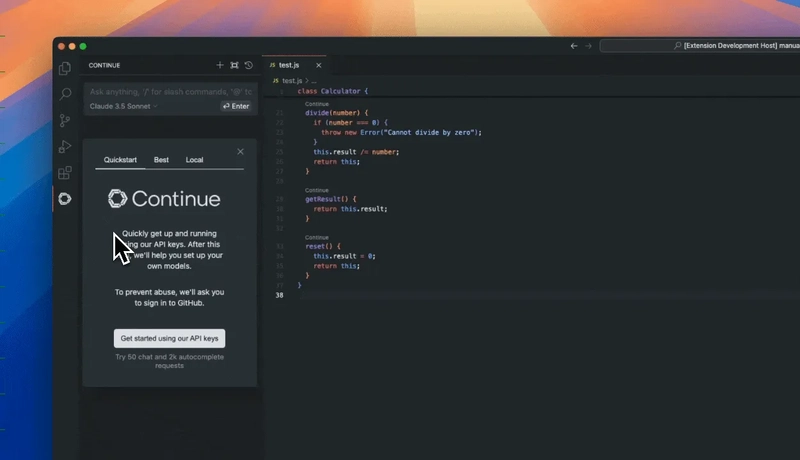AI has completely changed the way we code—whether it's writing functions faster, squashing bugs, or automating tedious tasks. One of the standout tools in this space is Cursor, which brings powerful AI directly into your development workflow. But as useful as it is, not everyone wants to rely on a closed-source tool. Whether it's about control, privacy, or just a love for open-source tech, many developers are now looking for alternatives they can tweak, host, and trust. Thankfully, there are some incredible open-source options out there worth exploring.
Before exploring the top open-source Cursor alternatives, it’s worth highlighting Apidog, an AI-powered platform designed to simplify API management and development. While Apidog isn’t a code-completion or coding assistant tool like Cursor, it excels at automating API testing, generating documentation, and improving team collaboration.
This article explores the top 10 open source alternatives to Cursor in 2025. These tools provide varying degrees of AI integration, customization, and flexibility—making them ideal for both solo developers and engineering teams.
1. Continue.dev
- GitHub: continuedev/continue
Continue.dev is an open-source autopilot for VS Code and other popular IDEs. It brings the essence of Cursor’s intelligent assistance directly into your workflow. What makes Continue.dev stand out is its support for both cloud-based LLMs and local models, making it a highly adaptable solution.
Key Features:
- Real-time code completion and suggestions.
- Integrated chat for code understanding.
- Extendable with plugins and support for different models.
- Easy setup and integration with existing projects.
- Context-aware prompts with memory.
- Multi-language support.
Ideal For: Developers who want a quick-to-setup, powerful coding assistant directly in their IDE.
2. OpenDevin
- GitHub: AI-App/OpenDevin
Inspired by Cognition’s Devin, OpenDevin is a bold attempt to create a fully open-source autonomous software engineer. It can navigate complex tasks, interpret instructions, and execute actions in a sandboxed development environment.
Key Features:
- Task planning and reasoning.
- Access to editor, shell, and browser.
- Pluggable LLM support.
- Visual workflow for task tracking.
- Human-in-the-loop interaction support.
- Modular architecture for agent upgrades.
Ideal For: Developers seeking a complete autonomous dev agent for experimental and complex project workflows.
3. AutoCode
- GitHub: acode/cli
AutoCode offers a lightweight Copilot-style assistant that runs locally or connects with various LLM APIs. Designed for speed and simplicity, it aims to reduce developer friction while maintaining flexibility.
Key Features:
- Autocompletion and explanation features.
- CLI-first design.
- Easily customizable prompts.
- Fast local inference engine.
- Works with both API and offline models.
- Git-aware suggestions.
Ideal For: Devs looking for a fast, simple, and hackable AI assistant.
4. TabbyML
- GitHub: TabbyML/tabby
TabbyML is a self-hosted AI coding assistant that works natively with IDEs like VS Code and JetBrains. It supports various open-source models and allows on-premise deployment for security-conscious teams.
Key Features:
- Fully local inference engine.
- Real-time code completion.
- Language and IDE agnostic.
- Works with GPU and CPU setups.
- REST API for custom integrations.
- Team workspace management.
Ideal For: Teams that require on-premise AI coding assistants for data privacy or compliance.
5. LAgent
- GitHub: THU-KEG/LAgent
LAgent (Large Language Model Agent) is a fully open-source multi-agent framework designed for complex tasks like software engineering, DevOps, and research workflows. It comes with a modern web-based UI for managing tasks and agents, making it a solid Cursor alternative for those looking for visual interaction and deeper task orchestration.
Key Features:
- Web-based UI for monitoring agents and workflows
- Multi-agent collaboration for distributed tasks
- Modular memory and retrieval system (supporting vector DBs)
- Native support for function-calling and tool use
- Integration with local and hosted LLMs (OpenAI, Claude, Vicuna, etc.)
- Built-in task planner and executor for code-related jobs
Ideal For: Teams or individuals who want a scalable, UI-driven platform to build, observe, and manage AI agents for coding and development tasks.
6. Smol Developer
- GitHub: smol-ai/developer
Smol Developer is an experiment in creating tiny, composable AI agents. Rather than replacing your IDE, it acts as a command-line developer you can direct via natural language.
Key Features:
- Modular, small-scale agents.
- Ideal for generating small web apps or scripts.
- Emphasis on transparency and control.
- Lightweight and fast.
- JSON-based output parsing.
- Built-in reproducibility features.
Ideal For: Tinkerers, indie developers, and hackers who want precise control over automated coding.
7. Devika
- GitHub: stitionai/devika
Devika is a conversational developer agent designed to interact with your development environment using natural language. It’s meant to work across the editor and terminal, making it effective for exploratory programming.
Key Features:
- Explains code and completes tasks.
- Reads and writes files in context.
- Shell integration for project-level execution.
- Memory retention between queries.
- Visual task breakdowns.
- Multi-language interaction.
Ideal For: Beginners and intermediate developers looking for interactive AI help.
8. GPT Researcher
- GitHub: assafeleloviv/gpt-Researcher
GPT Researcher is an autonomous agent designed to perform complex research and report generation tasks — but it's also extendable for software tasks, and it comes with a clean UI dashboard. Developers use it for writing, summarizing, and analyzing project documentation or code files as part of a larger pipeline.
Key Features:
- Browser-based dashboard for task tracking
- Multi-agent research and summarization workflows
- Prompt-based configuration of objectives
- Code documentation and explanation support
- Integrates with GPT-4, Claude, and open LLMs
- Markdown, PDF, and HTML output support
Ideal For: Devs and tech writers who want to automate research, codebase audits, and documentation using an agent in a clean UI.
9. Kilo Code
- GitHub: Kilo-Org/kilocode
Kilo Code is an open-source AI coding assistant designed to assist developers in planning, building, and fixing code. It integrates with VS Code and JetBrains IDEs, offering a seamless development experience.
Key Features:
- AI-Powered Code Assistance: Provides intelligent code suggestions, completions, and refactoring tips.
- Multi-Language Support: Compatible with various programming languages, enhancing versatility.
- Seamless IDE Integration: Works smoothly within popular IDEs like VS Code and JetBrains.
- Open-Source and Customizable: Fully open-source, allowing for customization and community contributions.
- Secure and Private: Ensures data privacy and security, suitable for enterprise environments.
Ideal For: Developers seeking a customizable, open-source AI coding assistant with robust IDE integration and a user-friendly interface.
10. LangGraph
- GitHub: langchain-ai/langgraph
LangGraph is an open-source framework for building LLM agents as stateful, visual computation graphs. Though it’s built on LangChain, it offers a UI (via integrations with LangSmith and its dev tools) where users can build structured workflows—including for software development tasks.
Key Features:
- Visual graph UI for agent flow creation
- Persistent memory and state tracking
- Supports async and parallel agent tasks
- Compatible with LangChain agents and tools
- Debug interface and observability
- Cloud or local deployment
Ideal For: Developers creating multi-step coding agents with visual control over execution paths and state management.
Conclusion
The rise of open-source coding assistants marks an exciting shift in software development. While Cursor paved the way with its intuitive design and AI integrations, the open-source community has responded with innovation, creativity, and transparency. Whether you value customization, privacy, or just love tinkering, there’s an open-source Cursor alternative tailored for your needs.
As these tools continue to mature, we can expect even more powerful workflows—blending human creativity with AI precision. Try a few of the options above, contribute to their growth, and help shape the future of intelligent software development.

















Top comments (26)
I use Cline + Openrouter API. It is good enough for me to replace Cursor.
Oh yeah that’s a great combo.
I am looking into other options myself, as my Copilot subscription is about to end.
I researched a bit but i can't seem to figure out how to get this combo to work.
Any pointers or tips on how you work?
i figured it out eventually and it's not quite bad!
however i am looking for something else. the credits model doesn't work for me.
i am looking into local LLM models using Ollama and continue.dev ad mentioned in another comment below.
That's pretty cool, Emmanuel! I have been using Cursor for some time, it is good, but I would really like to know what are the best Open Source Alternatives!
Always a good idea to have some good alternatives. 😎
Augment Code?
Great question! If you’re referring to AugmentCode, it’s a promising open-source AI coding assistant designed for IDE integration.
It’s still early-stage compared to others on the list, but definitely worth watching as it matures.
Great Resources!
Thank you Aryan
Very interesting list. I use Github Copilot mostly (at work), and has been playing around Cline. Now I have more toys to play with. Any of them supporting Ollama?
Yes — several tools here support Ollama either natively or with light config. Continue.dev works with Ollama out of the box, and OpenDevin and Smol Developer can be set up to use it as a local backend.
Great choices if you want to keep things private and fast. Enjoy exploring
Ah, that's fancy to know these Open Source tools to replace Cursor! Good list!
Thanks Good to know the list was useful
Overview: The emergence of AI tools like Cursor has transformed coding practices, leading many developers to explore open-source alternatives for greater control and customization.
Cursor and AI Transformation
Importance of Open Source Alternatives
Top Open Source Alternatives to Cursor (2025)
Continue.dev
OpenDevin
AutoCode
TabbyML
LAgent
Smol Developer
Devika
GPT Researcher
Kilo Code
LangGraph
made with love by axrisi

Great post! It’s impressive to see how much the open-source community has stepped up with real, usable alternatives to tools like Cursor. Continue.dev and TabbyML are definitely on my radar now. Thanks for curating this list ; super helpful!
Great roundup! It's exciting to see so many open source tools stepping up as viable Cursor alternatives. With AI-enhanced coding becoming the norm, it's good to have options that offer transparency, customization, and no vendor lock-in.
Thanks for sharing ❤
Some comments may only be visible to logged-in visitors. Sign in to view all comments.